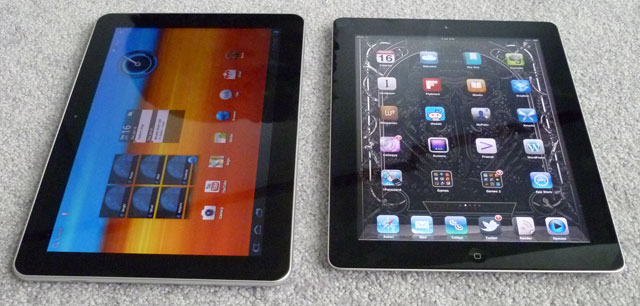
A Samsung Galaxy Tab 10.1 (left) and Apple iPad 2 (right)
Ryan Paul
A federal judge ordered a preliminary injunction late Tuesday against Samsung's Galaxy Tab 10.1 for violating a design patent for Apple's iPad. The injunction will go into effect immediately after Apple posts a $2.6 million bond to the court, at which point Samsung is barred from continued sales of the device in the US.
Apple had filed for a preliminary injunction against the Galaxy Tab in July 2011, after suing Samsung in April for "slavishly" copying its designs for the iPhone and iPad to make its competing Galaxy S smartphones and Galaxy Tab tablets.
Judge Lucy Koh previously determined that the Galaxy Tab did in fact infringe one of Apple's registered design patents, noting that "Samsung appears to have created a design that is likely to deceive an ordinary observer." During the trial, even Samsung's own lawyer couldn't tell the iPad and the Galaxy Tab 10.1 apart at a distance of about 10 feet from the bench.
However, Judge Koh originally denied the injunction, ruling that the design patent may be invalid in light of prior art submitted by Samsung. In particular, Samsung cited a concept video from the 1990s produced by publisher Knight Ridder, which describes a device similar to modern touchscreen tablets. It also pointed to a flat, tablet-like device that appeared in the sci-fi classic 2001: A Space Odyssey, used to read the latest news reports.
Apple successfully appealed Koh's finding that the design patent may be invalid, and the appellate court ordered the decision remanded to the district court. Judge Koh had scheduled a hearing on the matter for Friday, June 29, but late Tuesday canceled the hearing and entered her order for a preliminary injunction.
"Based on [the] record, the Court determines that further briefing and argument from the parties on the issue of the preliminary injunction is unnecessary," Koh wrote in her decision. "Moreover, because this Court has already found that denial of an injunction would cause Apple irreparable harm, any further delay of the injunction is not justified."
The US injunction follows an injunction in Australia that was later overturned on appeal, a German injunction that Samsung has so far successfully designed around (with the Galaxy Tab 10.1N), and a Dutch injunction that barred some Samsung smartphones but not the Galaxy Tab. Like it did in Germany, Samsung could offer a re-designed tablet that does not infringe on the iPad design patent, but it must be "more than colorably different" from the 10.1 and not embody "any design contained in US Design Patent No D504,889," according to Koh's ruling.
While the injunction won't likely cause Samsung any serious issues in the tablet marketâ€"the Galaxy Tab 10.1 has already been on sale for about a year in the USâ€"Apple can point to the judge's ruling as vindication for its claims that Samsung is a "copycat." Granting of a preliminary injunction is a strong indication that the judge believes Apple is likely to prove its claims of infringement at trial, and could seek significant damages. In particular, Koh noted that "there was some evidence that Samsung altered its design to make its product look more like Apple's," suggesting possible willful infringement.
As part of the order, Apple is required to post a $2.6 million bond with the court if later court decisions determine that the preliminary injunction was unwarranted. Predictably, Samsung filed an appeal within hours of Koh's decision. The full trial on the lawsuit is scheduled to begin on July 30, though it's possibly Samsung could argue for a stay in light of its appeal.
Meanwhile, Apple and Samsung have over 20 lawsuits pending globally, as well as a complaint with the US International Trade Commission. Additionally, Judge Koh is expected to make a ruling on a preliminary injunction against the Galaxy Nexus in conjunction with a second US patent infringement suit Apple filed against Samsung in early 2012.
No comments:
Post a Comment